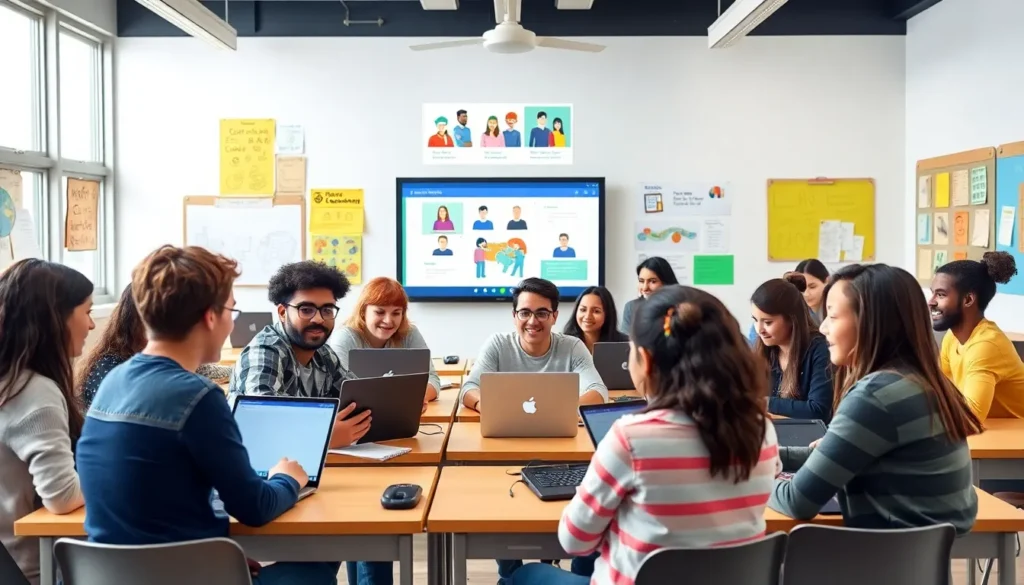In a world where technology reigns supreme, education is getting a much-needed makeover. Enter edtech programs, the superheroes of the learning landscape, swooping in to save students from the clutches of boredom and outdated textbooks. These programs aren’t just about flashy gadgets; they’re transforming classrooms into dynamic hubs of creativity and collaboration.
Table of Contents
ToggleOverview of Edtech Programs
Edtech programs encompass a range of digital tools and resources designed to enhance educational experiences. These programs offer interactive learning platforms, virtual classrooms, and online courses, all of which support personalized learning paths for students. Learning management systems, or LMS, serve as solid frameworks that help educators manage course content, track student progress, and facilitate communication.
Incorporating gamification elements, edtech programs motivate students through competitive and engaging activities. Students benefit from immediate feedback provided by intelligent tutoring systems, allowing them to address learning gaps effectively. Mobile applications also play a significant role, enabling access to educational resources anywhere at any time.
Moreover, data analytics in edtech programs provide valuable insights into student performance. Instructors can identify trends, adapt instructional methods, and tailor interventions based on data. This data-driven approach fosters a more responsive learning environment.
Collaborative tools within edtech encourage teamwork and communication among students. Digital platforms enable group projects, discussions, and peer feedback, enhancing critical thinking and problem-solving skills. Edtech programs also include adaptive learning technologies that cater to diverse learning styles and paces.
Both teachers and students leverage professional development resources offered by edtech programs. Educators gain access to training materials, workshops, and webinars that help them stay current with educational technology advancements. Students benefit from mentorship and guidance provided through dedicated support channels.
Overall, edtech programs revolutionize education, making it more engaging, personalized, and data-informed.
Benefits of Edtech Programs

Edtech programs significantly enhance the educational landscape, creating modern learning environments. These programs offer a variety of advantages for students and educators alike.
Enhanced Learning Experiences
Engagement increases through interactive learning platforms, allowing students to participate actively. Customization options contribute to personalized education, catering to diverse learning styles. Gamification elements motivate learners by transforming lessons into exciting challenges. Immediate feedback from intelligent tutoring systems helps identify and address knowledge gaps quickly. Students benefit from virtual classrooms that connect them with educators and peers without geographical constraints. Overall, these features create a dynamic atmosphere that fosters curiosity and retention.
Accessibility and Inclusivity
Accessibility improves as edtech programs provide resources for all learners, regardless of location. Mobile applications allow students to access educational materials at any time, breaking down barriers. Inclusivity expands through tools designed for special education, catering to various learning needs. Data analytics facilitate insights that help educators identify students who may require extra support. Collaborative tools encourage teamwork among peers with different abilities, promoting a unified learning experience. These advancements ensure that quality education reaches a wider audience, making learning opportunities available to everyone.
Types of Edtech Programs
Edtech programs encompass diverse solutions aimed at enhancing educational experiences. These programs include Learning Management Systems, Interactive Learning Tools, and Analytics and Assessment Programs.
Learning Management Systems
Learning Management Systems (LMS) serve as centralized platforms for managing online courses. They enable instructors to organize course content, track student assignments, and facilitate communication. Educators use LMS for sharing resources and providing immediate feedback. Tools like Moodle and Canvas demonstrate the effectiveness of LMS in promoting organized learning. Through these systems, learning becomes accessible and streamlined, creating a more efficient educational process.
Interactive Learning Tools
Interactive Learning Tools engage students through hands-on experiences. These tools encompass gamified lessons, simulations, and collaborative activities that foster active participation. Platforms like Kahoot and Nearpod enable educators to create dynamic learning environments. Students benefit from immediate feedback, enhancing retention and motivation. These engaging resources promote critical thinking skills while accommodating various learning styles.
Analytics and Assessment Programs
Analytics and Assessment Programs provide insights into student performance and learning trends. Educators can identify learning gaps through data collected from assessments. Tools such as Google Classroom and Edulastic allow teachers to analyze student progress effectively. Customized reports help in tailoring teaching methods to meet individual needs. By utilizing these programs, educators enhance the learning experience, ensuring that all students receive the support necessary for academic success.
Challenges in Implementing Edtech Programs
Edtech programs face several challenges that can hinder their successful implementation in educational settings.
Technical Issues
Technical issues often arise with the integration of edtech programs. Connectivity problems can disrupt online classes, leaving students unable to participate. Moreover, compatibility between different software systems can create significant hurdles for educators. Inadequate technical support can further exacerbate these challenges. Devices lacking necessary updates may experience performance issues, affecting the overall user experience. Training staff on new technologies proves essential, as insufficient training can lead to improper use. Addressing these technical obstacles is crucial for maximizing the effectiveness of edtech tools.
Resistance to Change
Resistance to change constitutes a common barrier in adopting edtech programs. Educators accustomed to traditional teaching methods may hesitate to embrace new technologies. Fear of inadequate technology skills can also inhibit willingness to integrate innovative tools into classrooms. Comfort with established routines leads many to resist exploring unfamiliar landscapes. Involving teachers in the selection and implementation processes can help alleviate concerns. Providing ongoing support encourages educators to adapt more readily to technological advances. Dealing with this resistance is vital for ensuring the successful integration of edtech initiatives.
Edtech programs are reshaping the educational landscape by fostering engagement and inclusivity. They empower both educators and students with tools that enhance learning experiences and provide personalized pathways. The integration of technology in classrooms not only motivates students but also equips teachers with valuable resources to address diverse learning needs.
Despite the challenges of implementation such as technical issues and resistance to change, the potential benefits far outweigh the obstacles. By embracing these innovative solutions, educational institutions can create dynamic and collaborative environments that prepare students for the future. The ongoing evolution of edtech promises to make quality education accessible to all, ensuring that every learner has the opportunity to thrive.








